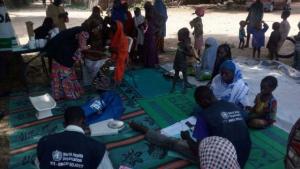Japan Supports WHO’s Emergency Programme in Northeast Nigeria
Abuja, 31 March 2017 - The Government of Japan recently announced a contribution of USD 903,000 towards World Health Organization’s (WHO) Emergency Programme in the crisis-affected Northeastern region of Nigeria. The contribution will benefit approximately 400,000 women, men and children through the provision of medicines and medical equipment, integrated basic primary health care services, establishment of effective referral mechanism for severally ill patients and strengthening of health sector coordination.
“This assistance is part of Japan’s new commitment of a grant aid of USD 53,630,350 for ‘non-military’ assistance pledged on 23-24 February 2017 at the Oslo Humanitarian Conference on Northeast Nigeria and Lake Chad Region in response to one of the world’s largest humanitarian crisis”, said Mr. Sadanobu Kusaoke, Ambassador of Japan to Nigeria.
Acknowledging the timely contribution from the Government of Japan, Dr Wondimagegnehu Alemu, WHO Country Representative in Nigeria emphasized the need for continued support from the donor community to ensure access to health services and prevent outbreak of diseases in volatile areas such as the Northeast region of Nigeria.
The on-going conflict in north-eastern part of the country and neighbouring regions of Cameroon, Chad and Niger has left over 10 million people displaced by 2017 with 1.7 million being internally displaced in Nigeria, and approximately 155,000 Nigerians as refugees. The conflict has also resulted in massive destruction of basic infrastructure, health and educational facilities, commercial buildings, private houses and agricultural assets.
WHO declared the humanitarian crisis in Nigeria a Grade 3 emergency in August 2016 in accordance with standard Inter-Agency Standing Committee (IASC) criteria. The overall goal of WHO’s Emergency Programme is to reduce avoidable mortality and morbidity through provision of life saving essential health services.
______________________________
For more information, please contact:
Technical contacts:
Dr Mary Stephen; Tel: +234 803 639 1332; Email: %20%20%20%20stephenm [at] who.int ( stephenm[at]who[dot]int)
Mr Ziyad Qamar; Tel: +234 817 0000 875; Email: %20%20%20%20%C2%A0qamarz [at] who.in ( qamarz[at]who[dot]in )
Media contact:
Dr Chima Onuekwe; Tel: +234 803 535 4876 Email: %20%20%20%20onuekwec [at] who.int ( onuekwec[at]who[dot]int)



